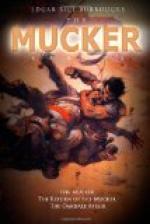To Billy Byrne, then, Pesita was a real general, and Billy, himself, a bona fide captain. He had entered an army which was at war with some other army. What they were warring about Billy knew not, nor did he care. There should be fighting and he loved that—that much he knew. The ethics of Pesita’s warfare troubled him not. He had heard that some great American general had said: “War is hell.” Billy was willing to take his word for it, and accept anything which came in the guise of war as entirely proper and as it should be.
The afternoon was far gone when Billy drew rein in the camp of the outlaw band. Pesita with the bulk of his raiders was out upon some excursion to the north. Only half a dozen men lolled about, smoking or sleeping away the hot day. They looked at Billy in evident surprise when they saw him riding in alone; but they asked no questions and Billy offered no explanation—his report was for the ears of Pesita only.
The balance of the day Billy spent in acquiring further knowledge of Spanish by conversing with those of the men who remained awake, and asking innumerable questions. It was almost sundown when Pesita rode in. Two riderless horses were led by troopers in the rear of the little column and three men swayed painfully in their saddles and their clothing was stained with blood.
Evidently Pesita had met with resistance. There was much voluble chattering on the part of those who had remained behind in their endeavors to extract from their returning comrades the details of the day’s enterprise. By piecing together the various scraps of conversation he could understand Billy discovered that Pesita had ridden far to demand tribute from a wealthy ranchero, only to find that word of his coming had preceded him and brought a large detachment of Villa’s regulars who concealed themselves about the house and outbuildings until Pesita and his entire force were well within close range.
“We were lucky to get off as well as we did,” said an officer.
Billy grinned inwardly as he thought of the pleasant frame of mind in which Pesita might now be expected to receive the news that eight of his troopers had been killed and his two “guests” safely removed from the sphere of his hospitality.
And even as his mind dwelt delightedly upon the subject a ragged Indian carrying a carbine and with heavy silver spurs strapped to his bare feet approached and saluted him.
“General Pesita wishes Senor Capitan Byrne to report to him at once,” said the man.
“Sure Mike!” replied Billy, and made his way through the pandemonium of the camp toward the headquarters tent.
As he went he slipped his hand inside his shirt and loosened something which hung beneath his left arm.
“Li’l ol’ ace-in-the-hole,” he murmured affectionately.
He found Pesita pacing back and forth before his tent—an energetic bundle of nerves which no amount of hard riding and fighting could tire or discourage.




